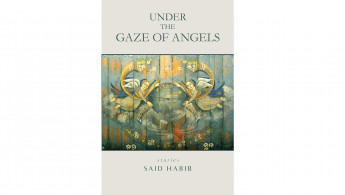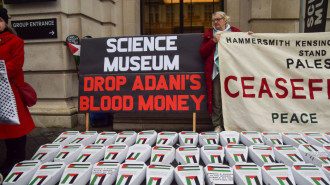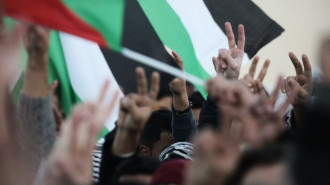Under the Gaze of Angels: An alluring recollection of Palestinian lives, from the British Mandate to 1967
To think of Palestine solely in terms of politics reduces the human dimension of the Palestinian people. Said Habib’s collection of stories are a delicate balance between the political and the personal, where the latter is unravelled in anecdotes and narratives that bring Palestinian lives closer to the reader.
Set in the time of the British Mandate up until the 1967 War, Habib’s stories are detailed and follow the intricacies of selected stories in his character’s daily routines. In the The Book Vendor the reader is acquainted with the protagonist’s new found freedom after her husband’s death.
Yet her friend and neighbour is revealed to be passing through similar strands of domestic oppression. Zuha finds her new status as a widow liberating – she pursues her independence and fails in love with a book vendor.
Tragedy strikes as the violence her friend experiences at home spills into Zuha’s personal life. From tragedy springs a new form of resilience, as Zuha takes on her personal narrative of grief to construct remembrance for both herself and the community she lives in.
"Said Habib’s collection of stories are a delicate balance between the political and the personal, where the latter is unravelled in anecdotes and narratives that bring Palestinian lives closer to the reader"
The Book Vendor portrays strong emotions, while the rest of the stories deal more with the intricacies of daily routine and disruption. Displacement, in particular, features prominently in the other three stories published in this collection.
As The English Gramophone portrays, displacement also harbours secrets. When a missing family member turns up after decades spent “walking”, the reader knows that a large proportion of the narrative is obliterated and neither is it completely revealed throughout the story.
The narrator’s account of forced displacement during the Arab revolt follows the ramifications of uprooting from one’s village to another, in this case to Haifa, and the subsequent mingling of Palestinians with the British for work.
Yet the underlying tension is revealed in sporadic occasions which accumulate, such as when a friendship between the narrator as a child, and a British boy, is disrupted because the latter’s family do not wish their son to start speaking Arabic, a language he picks up from daily interactions with the narrator’s family.
Yildiz the Turkish Woman opens with a powerful scene, in which the protagonist is to be forcibly repatriated from Palestine to Turkey after the defeat of the Ottoman Empire, but is stopped by Palestinians from her village. The story shifts from Yildiz, who despite being helped by the villagers, is still regarded somewhat of an outsider, to the increasing presence of British troops in Palestine and the effects of foreign military presence with regard to Palestinian families and traditions.
Time and fear become intertwined, as the story ends by presenting the reader thoughts of the unknown. “I tried to imagine what could possibly be worse than the lives we were already living, while bracing myself for what might come next,” the narrator muses.
Bringing daily life experiences closer to non-Palestinians makes the Palestinian experience more tangible and vivid, for the reader to identify with the feelings, if not the experience, of being Palestinian
The final story, Under the Gaze of the Angels, which bears the same title as the book, seems to tie all the themes together. In between stories of death, forced displacement and settler-colonialism, Palestinian identity navigates many different trajectories.
Palestinians have experienced the Nakba in many different ways, some leading to death, other to the diaspora abroad. Yet other Palestinians remained in colonised Palestine and later faced the possibilities of emigrating, out of necessity or the desire to create a better life. In all situations, the question of identity is prominent.
Habib’s discussion of Palestine and Palestinian identity follows the recollections of a family who is displaced from Haifa to Nazareth during the Nakba. It is only when the narrator becomes an adult that he is faced with the violations which Palestinians endure on a daily basis. The checkpoints are mentioned as one recurring site of colonial humiliation. Meanwhile, the narrator attempts to fit in while working with Israelis, yet the concept of land rights and identity remains prominent.
The author writes, “The whole argument about who the land belonged to seemed utterly absurd to us. Nevertheless, the Israelis had managed to cast doubt in our minds about our right to live in a country that had always been our own.”
One major connection which the author makes is how the 1967 war connects the younger generation of Palestinians to the earlier trauma of the Nakba and yet still left gaps in understanding, due to the colonial framework that sought to obliterate Palestine.
With the protagonist abroad, identity takes on a more profound meaning. Lost, altered, erased or abandoned, identity for Palestinians is a constant predicament. “People fight wars” to preserve identity, the author writes, and yet it can only take decades for identity to be lost.
Habib’s prose is detailed and the stories are touching, providing an insight into Palestinian lives which is overlooked, unless one is Palestinian. Bringing daily life experiences closer to non-Palestinians makes the Palestinian experience more tangible and vivid, for the reader to identify with the feelings, if not the experience, of being Palestinian.
Ramona Wadi is an independent researcher, freelance journalist, book reviewer and blogger specialising in the struggle for memory in Chile and Palestine, colonial violence and the manipulation of international law.



